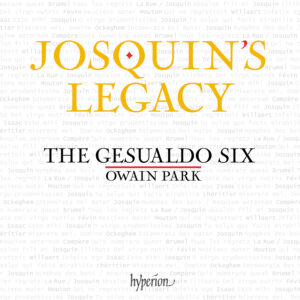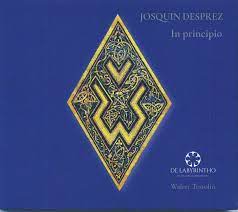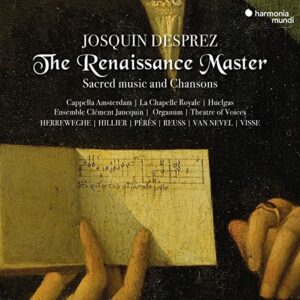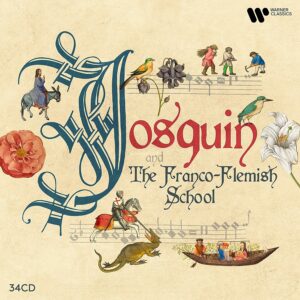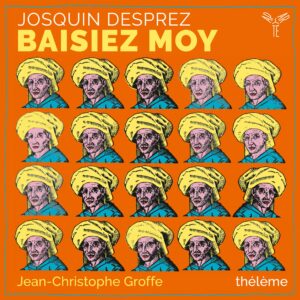Josquin 500 Part Two
Josquin 500 Part Two
The Josquin Legacy
Gesualdo Six
Harmonia Mundi CD
In Principio
De Labyrintho, Walter Tesolin
Baryton CD
Josquin Desprez
The Renaissance Master – Sacred Music and Chansons
Cappella Amsterdam, Daniel Reuss
Ensemble Clément Janequin, Ensemble Organum, Marcel Pérès
Ensemble Les Eléments,
Ensemble Clément Janequin, Dominique Visse
Huelgas-Ensemble, Paul Van Nevel
La Chapelle Royale, Philippe Herreweghe
Theatre of Voices, Paul Hillier
Harmonia Mundi 3xCD
Josquin and the Franco-Flemish School
Ensemble Gille Binchois
Kings Singers
Early Music Consort of London
Hilliard Ensemble
Warner Classics 34XCD boxed set
Josquin – Baisiez Moy
thélème, Jean-Christophe Groffe
Aparté CD
These releases commemorating the 500th anniversary of Josquin’s death take different, but equally diverting, approaches to assessing the composer’s legacy. They demonstrate the flexibility of approaches possible in interpreting the composer’s work.
Carlo Gesualdo and Josquin Desprez are worlds apart, in terms of musical language, personality, and chronology, but they share a particular coincidence of geography: both of them had formative musical experiences in Ferrara. Thus, it seemed natural for the Gesualdo Six to center their program The Josquin Legacy around Josquin’s brief but fruitful tenure in the d’Este court in 1503-1504. Another linchpin of the recording is its programming of Josquin’s predecessor Johannes Ockeghem, rival Heinrich Isaac, contemporaries Pierre de la Rue, Antoine Brumel, Loyset Compere, and Antoine de Fevin, and successors Antoine Willaert and Jean Lhéritier, all of whom also had connections to the d’Este court and Ferrara. The curation is excellent, and the singing is most compelling; Gesualdo Six present a well blended, sonorous, and vibrant sound and deliver contrapuntal passages with utmost clarity. Their performance of Josquin’s Nymphe des bois, a memorial piece for Ockeghem, is one of the finest I can remember of this often-recorded masterwork. Equally compelling are their warmly hued rendition of Willaert’s Infelix Ego and plangent performance of Pierre de la Rue’s Absalom Fili Mi, a piece once attributed to Josquin that underscores the musical connections shared among composers of the Franco-Flemish School who found inspiration in their Italian sojourns.
In Principio, a recording of De Labyrintho, has a warmer sound with a bit more of the room provided as ambience. The approach here is to present musical settings by Josquin of biblical and medieval texts that provide a chronology starting in Advent and ending with the infancy of Jesus, including motets about Mary, the Mother of Christ. They perform several longer pieces, including Liber generationis Jesu Christ, O Admirabile Commercium, and the album’s closer, the elegant Factum est Autem, and excel at shaping their large-scale architecture, suggesting that form coincided with local counterpoint in Josquin’s conception of motet composition.
The Renaissance Master is a triple-disc set that includes several of the best early music vocal ensembles performing sacred music and chansons. The liner notes, written by Henri Vanhault, admit that in celebrating Josquin, likely misattribution of pieces to him means that a compendium like this is also celebrating like-minded contemporary composers. With the chance to compare thrilling performances by such estimable interpreters, one needn’t worry too much if all of Josquin’s catalog is sorted. With such bounty, it is difficult to pick favorites, but the Huelgas Ensemble’s performance of the 24-voice Qui Habitat is quite something, as is the Theatre of Voices’ performance of Missa Beata Virgine. La Chapelle Royale wins the prize for fastest performance on record of Ave Maria Virgo Serena. For those who want an even deeper dive and the context of a compendious collection of composers of the Franco-Flemish School of which Josquin is a part, Warner Classics has issued a 34 CD boxed set that will keep one busy visiting fifteenth and early sixteenth century music throughout the holidays and beyond. Excellent performances by estimable ensembles here too.
Thélème takes a particularly novel approach to performing Josquin’s works, including several that seldom appear on recordings, incorporating modern instruments, such as Fender Rhodes electric piano and Buchla synthesizer, on their Aparté CD Baisiez Moy. The result is fascinating, reminding one that there were various heterogeneous ways in which these pieces were presented during the time period of their composition. Check out “Unisono 2” to hear the recording at its furthest out. Josquin’s work is durable enough to withstand and, on Baisiez Moy, flourish in imaginative renditions.
-Christian Carey
